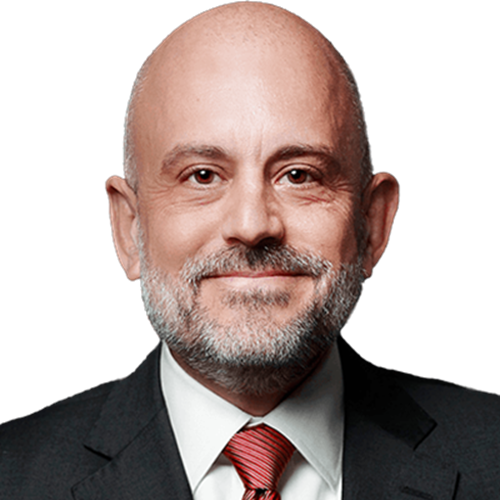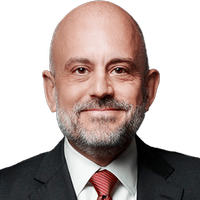Are You Making One of the Top 3 Investing Mistakes?
These all-too-common mistakes are easily avoidable. If you've gotten tripped up, like so many other investors have, here's how to fix the problem before it's too late.

Profit and prosper with the best of Kiplinger's advice on investing, taxes, retirement, personal finance and much more. Delivered daily. Enter your email in the box and click Sign Me Up.
You are now subscribed
Your newsletter sign-up was successful
Want to add more newsletters?

Delivered daily
Kiplinger Today
Profit and prosper with the best of Kiplinger's advice on investing, taxes, retirement, personal finance and much more delivered daily. Smart money moves start here.

Sent five days a week
Kiplinger A Step Ahead
Get practical help to make better financial decisions in your everyday life, from spending to savings on top deals.

Delivered daily
Kiplinger Closing Bell
Get today's biggest financial and investing headlines delivered to your inbox every day the U.S. stock market is open.

Sent twice a week
Kiplinger Adviser Intel
Financial pros across the country share best practices and fresh tactics to preserve and grow your wealth.

Delivered weekly
Kiplinger Tax Tips
Trim your federal and state tax bills with practical tax-planning and tax-cutting strategies.

Sent twice a week
Kiplinger Retirement Tips
Your twice-a-week guide to planning and enjoying a financially secure and richly rewarding retirement

Sent bimonthly.
Kiplinger Adviser Angle
Insights for advisers, wealth managers and other financial professionals.

Sent twice a week
Kiplinger Investing Weekly
Your twice-a-week roundup of promising stocks, funds, companies and industries you should consider, ones you should avoid, and why.

Sent weekly for six weeks
Kiplinger Invest for Retirement
Your step-by-step six-part series on how to invest for retirement, from devising a successful strategy to exactly which investments to choose.
Those who have been investing long-term know that the market can challenge even the most seasoned professional. Volatility, coupled with the uncertainty of what’s next, can lead many to question why they invest in the market at all.
Oftentimes, investors find themselves in a place of fear or uncertainty. This leads to decisions based on emotion and half-truths or misconceptions about money. In this state, crucial mistakes are made that impact effective retirement savings strategies and disrupt income and cash flow in retirement.
Three mistakes are quite common, and very avoidable once the facts are laid out and investors begin to see that what they thought to be true doesn’t always represent the full story:
From just $107.88 $24.99 for Kiplinger Personal Finance
Become a smarter, better informed investor. Subscribe from just $107.88 $24.99, plus get up to 4 Special Issues

Sign up for Kiplinger’s Free Newsletters
Profit and prosper with the best of expert advice on investing, taxes, retirement, personal finance and more - straight to your e-mail.
Profit and prosper with the best of expert advice - straight to your e-mail.
Mistake #1: Focusing on Average Rates of Returns
Fact: An advertised average rate of return can provide a false representation of an investment’s actual result. Frankly, the numbers don’t often add up.
Take a hypothetical fund averaging 25% over the last two years. Knowing this fund “averaged” 25% would lead to the assumption that the investor has made money. However, it is possible to have not made a dime, so it’s important to pay attention to the math.
Let’s assume an opening account balance of $100. If the investment loses 50% in the first year, then turns around to earn 100% the next year, that mathematically equates to a 25% average, and the same $100 we started with.
$100 – 50% = $50 + 100% = $100
The takeaway: Average returns don’t necessarily translate to dollars in your pocket. Investors can avoid this mistake by focusing instead on consistency, using year-over-year returns as a guide to evaluate a fund’s performance. Check out an investment’s performance during historically volatile times to determine its consistency. The goal is to look for investments with returns that show peaks and valleys that are mild — not wild — reflecting consistent performance and lower volatility.
Mistake #2 Focusing Too Much on Fees and Not Enough on Diversification
Fact: Fees are an important consideration for investors, but they should not be their primary focus. Instead, direct attention toward diversification and risk management.
Asset allocation, diversification and risk management are based on philosophies for how to spread out risk. If we believe these philosophies are the correct approach to building a portfolio, then we cannot limit our thinking to only fees. We have to consider product types and investment styles, otherwise we work against the entire paradigm.
This is important because there are many investment types (institutional investments, alternatives, annuities, life insurance, managed and passive investments). Each has a place when building a diversified portfolio, and all carry varying levels of fees.
The takeaway: Consider fees, but only when comparing investments within the same category. (In other words, compare indexed funds to indexed funds.) Focus on building a portfolio that combines passive, managed and institutional investments, along with different product types to achieve a level of diversification not possible by using only one approach, and one fee structure.
Mistake #3 Thinking a Tax Deferral Is a Tax Savings
Fact: Tax-deferred retirement accounts are a deferral of liability, not a way to avoid taxes. Just keep in mind that a tax deferral should not be considered a tax savings, it is exactly what the name suggests — it’s a deferral. It is a pay-me-now or pay-me-later arrangement with the government.
Nearly everyone’s tax preparer has recommend funding their retirement plan to “save” on taxes. It is the most common advice given by tax professionals, but a tax deduction through deferral is not the same as a true tax savings. In fact, a typical scenario illustrates that there is no savings at all:
Let’s assume a $10,000 per year contribution into a traditional retirement account. Deduct the contribution and assume a hypothetical 8% annual rate of return compounded over 30 years. This would accumulate $1,223,000, which is 100% taxable upon withdrawal. Assuming a 25% tax liability, taxes owed would be $305,000, netting around $917,000.
Compare that to an after-tax account, where a $10,000 net of a 25% tax liability would leave $7,500 to invest. Assuming the $7,500 a year is then deposited into a tax-free account over the same 30 years at the same 8%, the same net amount of money is accumulated: $917,000 (accessible tax-free in retirement).
The takeaway: There is not necessarily a tax savings when depositing into a pretax retirement account. It’s just a matter of when the taxes must be paid. And yes, it is OK to participate in a company plan up to the employer’s match, preferably via a Roth, if available. The larger issue to consider is controlling the outcome, which becomes more challenging in a tax-deferred situation:
- Will tax rates be higher, lower or the same when the taxes are due?
- Will the investor have the same tax deductions, or will deductions — like mortgage interest and child credits — no longer apply, placing the investor in a higher tax bracket?
- Does the investor want to access the money prior to age 59½*? If so, they’re out of luck, unless they take loans.
- Do they need the money by 70½**? If not, the IRS will still force distributions to begin.
Asking these questions helps paint a full picture, one which includes long-term planning versus the immediate gratification of perceived tax savings.
The Bottom Line
Most investors are guilty of making one or more of the above mistakes at some point. The key is to define purpose and clear vision for the money (what will it be used for and when?), consider the full story rather than commonly believed half-truths, and do the math. These steps will unravel the mysteries of investing, and lead to clearer, smarter decision making.
*Distributions are subject to an early withdrawal penalty of 10% on withdrawals prior to 59½, and you have very limited access to the money while you remain employed even if you are OK with paying the penalty! It is only when you terminate employment that you can have access to your money without a hardship or by taking a loan.
**The IRS enforces a Required Minimum Distribution (RMD) in the year you turn 70½.
Securities offered through Kalos Capital, Inc., Member FINRA/SIPC/MSRB and investment advisory services offered through Kalos Management, Inc., an SEC registered Investment Advisor, both located at11525 Park Wood Circle, Alpharetta, GA 30005. Kalos Capital Inc. and Kalos Management Inc. do not provide tax or legal advice. Skrobonja Financial Group LLC and Skrobonja Insurance Services LLC are not an affiliate or subsidiary of Kalos Capital Inc. or Kalos Management Inc.
Securities offered only by duly registered individuals through Madison Avenue Securities, LLC. (MAS), Member FINRA & SIPC. Advisory services offered only by duly registered individuals through AE Wealth Management (“AEWM”), a registered investment adviser. Skrobonja Financial Group, LLC, Skrobonja Insurance Services, LLC, AEWM and MAS are not affiliated entities. The article and opinions in this publication are for general information only and are not intended to provide specific advice or recommendations for any individual. We suggest that you consult your accountant, tax or legal adviser with regard to your individual situation.
Profit and prosper with the best of Kiplinger's advice on investing, taxes, retirement, personal finance and much more. Delivered daily. Enter your email in the box and click Sign Me Up.

Brian Skrobonja is a Chartered Financial Consultant (ChFC®) and Certified Private Wealth Advisor (CPWA®), as well as an author, blogger, podcaster and speaker. He is the founder and president of a St. Louis, Mo.-based wealth management firm. His goal is to help his audience discover the root of their beliefs about money and challenge them to think differently to reach their goals. Brian is the author of three books, and his Common Sense podcast was named one of the Top 10 podcasts by Forbes. In 2017, 2019, 2020, 2021 and 2022, Brian was awarded Best Wealth Manager. In 2021, he received Best in Business and the Future 50 in 2018 from St. Louis Small Business.
-
 Nasdaq Leads a Rocky Risk-On Rally: Stock Market Today
Nasdaq Leads a Rocky Risk-On Rally: Stock Market TodayAnother worrying bout of late-session weakness couldn't take down the main equity indexes on Wednesday.
-
 Quiz: Do You Know How to Avoid the "Medigap Trap?"
Quiz: Do You Know How to Avoid the "Medigap Trap?"Quiz Test your basic knowledge of the "Medigap Trap" in our quick quiz.
-
 5 Top Tax-Efficient Mutual Funds for Smarter Investing
5 Top Tax-Efficient Mutual Funds for Smarter InvestingMutual funds are many things, but "tax-friendly" usually isn't one of them. These are the exceptions.
-
 Social Security Break-Even Math Is Helpful, But Don't Let It Dictate When You'll File
Social Security Break-Even Math Is Helpful, But Don't Let It Dictate When You'll FileYour Social Security break-even age tells you how long you'd need to live for delaying to pay off, but shouldn't be the sole basis for deciding when to claim.
-
 I'm an Opportunity Zone Pro: This Is How to Deliver Roth-Like Tax-Free Growth (Without Contribution Limits)
I'm an Opportunity Zone Pro: This Is How to Deliver Roth-Like Tax-Free Growth (Without Contribution Limits)Investors who combine Roth IRAs, the gold standard of tax-free savings, with qualified opportunity funds could enjoy decades of tax-free growth.
-
 One of the Most Powerful Wealth-Building Moves a Woman Can Make: A Midcareer Pivot
One of the Most Powerful Wealth-Building Moves a Woman Can Make: A Midcareer PivotIf it feels like you can't sustain what you're doing for the next 20 years, it's time for an honest look at what's draining you and what energizes you.
-
 I'm a Wealth Adviser Obsessed With Mahjong: Here Are 8 Ways It Can Teach Us How to Manage Our Money
I'm a Wealth Adviser Obsessed With Mahjong: Here Are 8 Ways It Can Teach Us How to Manage Our MoneyThis increasingly popular Chinese game can teach us not only how to help manage our money but also how important it is to connect with other people.
-
 Looking for a Financial Book That Won't Put Your Young Adult to Sleep? This One Makes 'Cents'
Looking for a Financial Book That Won't Put Your Young Adult to Sleep? This One Makes 'Cents'"Wealth Your Way" by Cosmo DeStefano offers a highly accessible guide for young adults and their parents on building wealth through simple, consistent habits.
-
 Global Uncertainty Has Investors Running Scared: This Is How Advisers Can Reassure Them
Global Uncertainty Has Investors Running Scared: This Is How Advisers Can Reassure ThemHow can advisers reassure clients nervous about their plans in an increasingly complex and rapidly changing world? This conversational framework provides the key.
-
 I'm a Real Estate Investing Pro: This Is How to Use 1031 Exchanges to Scale Up Your Real Estate Empire
I'm a Real Estate Investing Pro: This Is How to Use 1031 Exchanges to Scale Up Your Real Estate EmpireSmall rental properties can be excellent investments, but you can use 1031 exchanges to transition to commercial real estate for bigger wealth-building.
-
 Should You Jump on the Roth Conversion Bandwagon? A Financial Adviser Weighs In
Should You Jump on the Roth Conversion Bandwagon? A Financial Adviser Weighs InRoth conversions are all the rage, but what works well for one household can cause financial strain for another. This is what you should consider before moving ahead.
